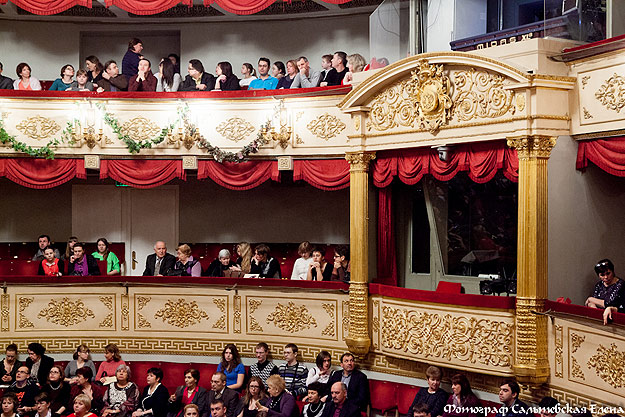History
 |
There are certain unspoken rules of theatre etiquette and learning them will acknowledge you as a courteous audience member and enable you to avoid embarrassment.
«The theatre can rightfully be called the school of morality and ethics. Indeed, it has a huge impact on customs and morals and can serve as highly effective means of forming the tastes, mitigating the roughness and severity of the manners, destroying prejudices and ridiculing perverse concepts. At the same time, the theatre can inspire a loathing of vices, arouse the sensitivity of the soul and evoke the noblest feelings of the heart.
It is in the theater that more than anywhere else, we are touched by the virtue and are enchanted by courage and devotion to the Fatherland admire good deeds. Everything excites at the theatre, everything creates illusion and makes the impressions more vivid and strong.
But not all plays written for the theater have a beneficial effect on the moral development of young people. Therefore, when choosing the play and visiting the theater, young people have to be guided by the opinion of experienced people, known for their education and strict moral rules.
A visit to the theatre has always been a special occasion, just as the evenings, balls and similar events, therefore there are certain rules of decency that have to be carefully observed. There, as well as everywhere else, a careful observance of the politeness rules and certain decency are expected from the well-educated people.
First of all, you need to pay courteous attention to the public around you. It would be rather impolite to constantly jostle and rub around the people around you, step on the ladies' dresses and such.
If you attend the performance as part of the group, then one of the gentlemen should buy the tickets at the ticket office and free the ladies from labor to present their entrance tickets.
When the box is open, the gentleman should seat the ladies in the first seats, according to their age and status in the society.
The man should never allow a lady, even a perfect stranger to him, to sit in a box behind him.
Young people, when taking their seats, should try not to lean too forward, not to disturb people sitting in front of them.
The gentleman, well acquainted with social norms of taste and decency, knows that he should pay for the seats and make sure that the valet takes off the ladies' top coat, which they cannot keep on.
If the ladies enter the box, where the gentleman occupies the front seat, decency requires that he offers his seat to one of them, even if they are perfect strangers to him. If they refuse his offer, he should nevertheless insist on his proposal.
During the performance one has to observe complete silence in order not to distract the audience from following the progress of the play. One may, however, communicate quietly his thoughts to his companion about the play or about the artists performing on stage.
Only small-minded people and commoners can allow themselves to whistle or clap their hands loudly, stamping their feet.
Applaud in moderation. Ladies in any case should clap only slightly, for show.
Bringing a lorgnette or binoculars with you you have to use them appropriately, only for the stage, you should not observe the audience through the lorgnette, especially the ladies sitting in the auditorium, as it is deemed extremely indecent.
If you peel an orange or eat a candy, then you should offer them to people sitting in your box, even if you are not acquainted.
In addition, a socialite should offer the ladies the playbill and also inquire if they would like to have a soft drink, fruit, or sweets, and in the case of an affirmative answer, immediately deliver the desired. During intermissions or at the very end of the performance, the gentleman should accompany the ladies to the foyer. It is his duty to help the ladies find their overdress left with the usher.
Some theatre goers, especially ladies, endowed with great sensitivity, cannot hold back the tears during certain pathetic and moving scenes of the play. It is highly inconsiderate and even rude to ridicule and clearly condemn such faint-hearted persons on the part of more severe individuals.
At the theatre as well as at the circus, never call for an actress just because of her looks. Also, never call for an actor on the ground that you know him personally. We should appreciate art regardless of the person and love art for art's sake.
Wherever you are, at the theatre, at the circus, or anywhere else, please do remember that once you become part of the group of people, united by one common goal, which is taking pleasure or deriving benefit, for personal enjoyment or entertainment, or just to satisfy curiosity, you do not belong to yourself anymore. You have voluntarily deprived yourself of the right to show off your personality, your personal desires and interests. You have become a mere unit, fraction, a member of that huge entity, which is called the audience. Being part of that entity, you have to obey its rules and laws.»
From the book «Rules of social life and etiquette. Good manners». Compiled by: Yuriev and Vladimirskiy. St. Petersburg.,1889.
















